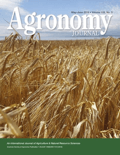
AGRONOMY JOURNAL
Scope & Guideline
Exploring the Future of Agronomy and Crop Science
Introduction
Aims and Scopes
- Crop Management Practices:
The journal extensively covers studies on various crop management techniques, including planting dates, nutrient management, irrigation practices, and the use of cover crops to enhance productivity and sustainability. - Soil Health and Fertility:
Research articles often focus on soil health, nutrient dynamics, and the impact of different management practices on soil properties, emphasizing the importance of maintaining soil fertility for sustainable agriculture. - Integrated Farming Systems:
The journal promotes research on integrated farming systems that combine crops and livestock, exploring the interactions between different agricultural components to optimize productivity and resource use. - Climate Change Impacts:
Studies addressing the effects of climate change on crop yields, soil health, and agricultural practices are prevalent, reflecting the journal's commitment to understanding and mitigating climate-related challenges in agriculture. - Precision Agriculture Technologies:
The journal features research on precision agriculture, including the use of sensor technology, remote sensing, and data analytics to improve crop management decisions and enhance agricultural efficiency. - Sustainable Practices:
A strong emphasis is placed on sustainable agricultural practices, including organic farming, conservation tillage, and the use of cover crops to improve soil health and reduce environmental impact. - Genetic Improvement and Breeding:
Research related to plant breeding, genetic diversity, and the development of crop varieties resilient to pests, diseases, and environmental stressors is a key focus area.
Trending and Emerging
- Digital Agriculture and Data Analytics:
The integration of big data, machine learning, and digital tools in agriculture is a rapidly growing area, focusing on data-driven decision-making to enhance crop management and productivity. - Climate Resilience and Adaptation Strategies:
Research on developing adaptive strategies to cope with climate change impacts, including studies on drought resistance and crop resilience, is increasingly prioritized. - Soil Carbon Sequestration:
There is a rising interest in research aimed at understanding and enhancing soil carbon sequestration as a means to combat climate change and improve soil health. - Agroecological Approaches:
Emerging studies emphasize agroecological practices that promote biodiversity, ecosystem services, and sustainable resource management in agricultural systems. - Precision Crop Management Techniques:
Innovations in precision agriculture, including advancements in remote sensing and site-specific management practices, are trending as key areas of research. - Cover Crop and Soil Health Research:
The use of cover crops to improve soil health, reduce erosion, and enhance nutrient cycling is gaining attention, reflecting a broader shift toward sustainable farming practices. - Nutrient Management Innovations:
Research focusing on innovative nutrient management practices, including the use of organic amendments and enhanced efficiency fertilizers, is trending as farmers seek to optimize production while minimizing environmental impact.
Declining or Waning
- Traditional Fertilization Techniques:
Research focusing on conventional fertilization methods is less prominent as newer sustainable practices and precision nutrient management strategies gain traction. - Single Crop Systems:
There is a noticeable decrease in studies solely centered on single cropping systems, as integrated and rotational cropping systems are increasingly favored for their benefits to soil health and productivity. - Pesticide Use and Chemical Control:
The journal has shifted away from extensive coverage of chemical pest control methods, reflecting a growing preference for integrated pest management (IPM) approaches that prioritize ecological balance. - Historical Yield Comparisons:
While historical yield data remains important, there is a waning focus on purely comparative studies of past yield trends, as more research emphasizes predictive modeling and adaptive strategies for future challenges. - Generalized Agricultural Practices:
Research that does not specifically address localized agricultural practices or context-specific solutions has seen a decline, as the journal increasingly emphasizes tailored approaches to agronomy.
Similar Journals
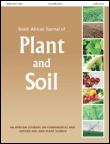
South African Journal of Plant and Soil
Innovating research for a greener tomorrow.South African Journal of Plant and Soil is an esteemed academic publication dedicated to advancing the fields of Ecology, Plant Science, and Soil Science. Published by TAYLOR & FRANCIS LTD in the United Kingdom, this journal has been a vital resource since its inception in 1984, providing a platform for innovative research and scholarly articles that address critical issues in plant and soil management. With a current impact factor placing it in the Q3 category according to the 2023 rankings, it occupies an influential position within the academic community, especially amongst researchers focused on agricultural and environmental sciences. Although not an open-access journal, it remains accessible to a broad audience through libraries and institutions that recognize its value in facilitating ecologically and environmentally focused discussions. The journal's ongoing commitment to publishing high-quality research ensures that it plays a pivotal role in nurturing knowledge and fostering advancements in sustainable practices across southern Africa and beyond.

AGROCHIMICA
Illuminating the path to sustainable agricultural practices.AGROCHIMICA is an eminent journal published by PISA UNIV PRESS, dedicated to advancing the fields of Agronomy, Crop Science, Food Science, and Soil Science. With a rich history dating back to its inception in 1973, this journal has evolved through various phases of publication, illustrating its commitment to delivering quality research over several decades. Although currently categorized in the Q4 quartile across its respective disciplines, AGROCHIMICA provides a platform for foundational and innovative studies that contribute to knowledge in agricultural practices and sustainable food systems. While the journal is not open access, it remains a valuable resource for researchers, professionals, and students interested in Italy's and the global agricultural landscape, fostering a greater understanding of the complexities within these interconnected fields. The ISSN associated with this journal is 0002-1857, and it is published from Pisa, Italy, addressing the evolving challenges in agriculture with a spotlight on rigorous scientific inquiry.

Crop Forage & Turfgrass Management
Nurturing the science of crops and turfgrass management.Crop Forage & Turfgrass Management, published by WILEY, serves as an essential platform for researchers, professionals, and students in the fields of agronomy, crop science, plant science, and soil science. With a focus on advancing knowledge in the management of crops, forage systems, and turfgrass, this journal plays a pivotal role in disseminating innovative research and practical applications that drive agricultural sustainability and productivity. Despite its Q3 ranking in various agricultural and biological science categories according to Scopus, it aims to enhance its impact and relevance in the academic community through high-quality publications. As a journal converged from 2015 to 2024, it invites contributions that address contemporary challenges and solutions in crop management, ensuring accessibility to vital knowledge for the advancement of agricultural practices. Situated in the United States, it also reflects the diverse agricultural landscapes and practices of the region, making it a valuable resource for a global audience.

Agrivita
Empowering researchers to cultivate groundbreaking agricultural insights.Agrivita is a distinguished, open-access journal dedicated to advancing research and knowledge in the fields of Agronomy and Crop Science. Published by Brawijaya University, Faculty of Agriculture, this journal has been providing a platform for high-quality scholarly articles since 2010. Located in the vibrant country of Indonesia, Agrivita plays a vital role in the exchange of innovative agricultural research, particularly within the Southeast Asian context. As of 2023, it holds a respectable Q3 ranking in its category, showcasing its commitment to scholarly excellence and visibility. With an increasing impact on the academic community, and its current Scopus rank placing it in the 48th percentile, Agrivita stands as a crucial resource for researchers, professionals, and students eager to deepen their understanding of crop science and agronomy. The journal's scope encompasses cutting-edge research that addresses both fundamental and applied aspects of agriculture, ensuring it remains relevant to today's pressing agricultural challenges. Its open access model enhances global accessibility, fostering a collaborative environment where diverse opinions and findings can converge.

Revista Brasileira de Ciencias Agrarias-Agraria
Illuminating the path for future agricultural advancements.Revista Brasileira de Ciencias Agrarias-Agraria is an esteemed academic journal published by the Universidade Federal Rural de Pernambuco, dedicated to advancing the field of agricultural and biological sciences. With a focus on disseminating high-quality research, this journal plays a pivotal role in fostering knowledge exchange within the agricultural community, particularly in Brazil and beyond. As a Q3 ranked publication in the Agricultural and Biological Sciences category, Revista Brasileira de Ciencias Agrarias-Agraria contributes to the growing body of literature by featuring insightful articles from both emerging and established researchers in the field. The journal has been consistently published since 2011 and is committed to open access principles, ensuring that research findings are accessible to a wide audience. Researchers, professionals, and students will find this journal an invaluable resource for deepening their understanding of current trends and innovations in agriculture.
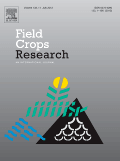
FIELD CROPS RESEARCH
Pioneering Discoveries in Agronomy and Soil ScienceFIELD CROPS RESEARCH is a premier academic journal published by Elsevier, dedicated to advancing knowledge in the fields of Agronomy and Crop Science as well as Soil Science. Now in its 46th year of publication, this esteemed journal has established itself as a leading resource, holding a prestigious Q1 ranking in both the Agronomy and Soil Science categories, with a remarkable blend of rigorous peer-reviewed research and innovative findings. With a Scopus ranking of #27/406 in Agronomy and #20/159 in Soil Science, and a notable 93rd and 87th percentile respectively, FIELD CROPS RESEARCH plays a vital role in informing practices that drive sustainable agriculture and optimize crop production. Although not an open access journal, it remains highly accessible to the global research community and offers critical insights that influence policy and agricultural practices worldwide. Researchers, professionals, and students are encouraged to delve into this journal, as it continues to shape the future of field crop research through impactful studies and comprehensive reviews.

Frontiers in Agronomy
Pioneering Research for a Greener TomorrowFrontiers in Agronomy, published by FRONTIERS MEDIA SA, is a premier open-access journal dedicated to the dynamic field of agronomy. Launched in 2019, it has rapidly established itself as a leader in the publication of groundbreaking research, holding a distinguished Q1 ranking in several categories including Agricultural and Biological Sciences, Agronomy and Crop Science, Plant Science, and Soil Science as of 2023. With an impressive Scopus ranking that positions it among the top journals in its field, this journal provides a valuable platform for researchers, professionals, and students alike to disseminate and access innovative research and critical insights in agronomy. Every contribution to Frontiers in Agronomy undergoes rigorous peer review, ensuring that high-quality research remains at its core. Accessible to all since its inception, it serves as a vital resource for advancing knowledge and fostering collaboration within the global agronomic community, supporting the quest for sustainable agricultural practices and enhanced crop productivity.
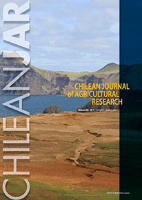
Chilean Journal of Agricultural Research
Connecting global research to local agricultural challenges.Chilean Journal of Agricultural Research, published by INST INVESTIGACIONES AGROPECUARIAS - INIA, is a premier academic journal dedicated to the advancement of knowledge in the fields of Agronomy, Crop Science, Animal Science, and Zoology. With an ISSN of 0718-5839, this journal serves as a vital resource for researchers, professionals, and students alike, facilitating the dissemination of impactful research from Chile and around the globe. Classified as a Q2 journal in both Agronomy and Crop Science and Animal Science and Zoology as of 2023, it occupies a significant position in academic rankings, highlighted by its Scopus metrics, which recognize its contributions to the field. The journal operates under an Open Access model, ensuring that valuable research is accessible to a wider audience, thereby promoting innovation and collaboration. With a converged publication timeline from 2008 to 2024, the Chilean Journal of Agricultural Research continues to enhance understanding and foster advancements in agricultural science, thus playing an instrumental role in addressing contemporary challenges in food security and sustainable practices.
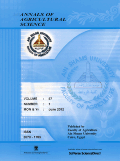
ANNALS OF AGRICULTURAL SCIENCES
Advancing Agricultural Knowledge for a Sustainable FutureANNALS OF AGRICULTURAL SCIENCES, published by Elsevier, stands as a leading open access journal dedicated to the multifaceted field of agricultural sciences. Since its inception in 2011, this journal has served as a pivotal platform for the dissemination of high-quality research, covering areas such as agronomy, animal science, horticulture, food science, plant science, and soil science. With an impressive Q1 ranking across multiple disciplines and notable positions in Scopus Ranks—including #6 in Animal Science and Zoology and #3 in Horticulture—this journal is recognized globally for its significant contribution to advancing agricultural innovations. The journal caters to a diverse audience of researchers, professionals, and students, providing them with open access to cutting-edge studies that address critical issues in agricultural productivity and sustainability. Its commitment to high-impact research ensures that articles contribute meaningfully to the scientific community, fostering advancements in agricultural practices and policies.
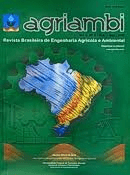
Revista Brasileira de Engenharia Agricola e Ambiental
Empowering Global Knowledge in Agronomy and SustainabilityRevista Brasileira de Engenharia Agricola e Ambiental, published by the Universidade Federal de Campina Grande, serves as a pivotal platform for researchers and professionals in the fields of agricultural and biological sciences, agronomy, and environmental engineering. With an open-access policy since 2000, this journal aims to foster global dissemination of innovative research and practices, ensuring that high-quality findings are accessible to all. Operating in Brazil, it holds notable rankings, including Q2 in the categories of Agricultural and Biological Sciences (miscellaneous) and Agronomy and Crop Science, indicating its strong academic impact and influence within these fields. As of 2023, it ranks #68 out of 193 in Agricultural and Biological Sciences and #188 out of 406 in Agronomy and Crop Science, representing its commitment to advancing scientific knowledge. The journal primarily focuses on publishing studies that address challenges in agricultural engineering and environmental sustainability, making it an essential read for students, researchers, and professionals who are dedicated to innovation and excellence in these dynamic fields.